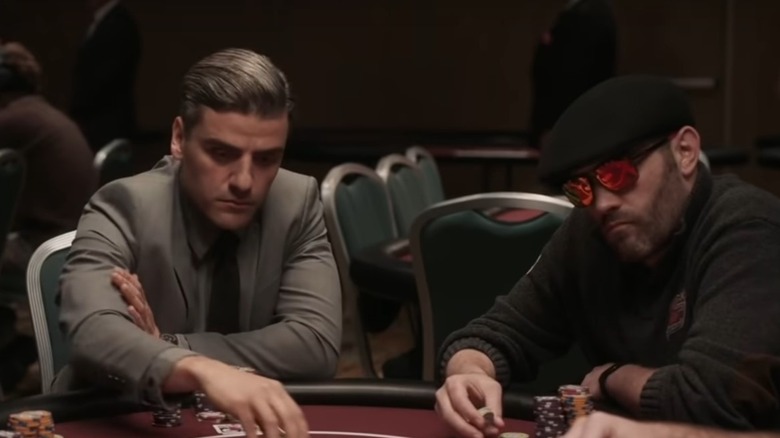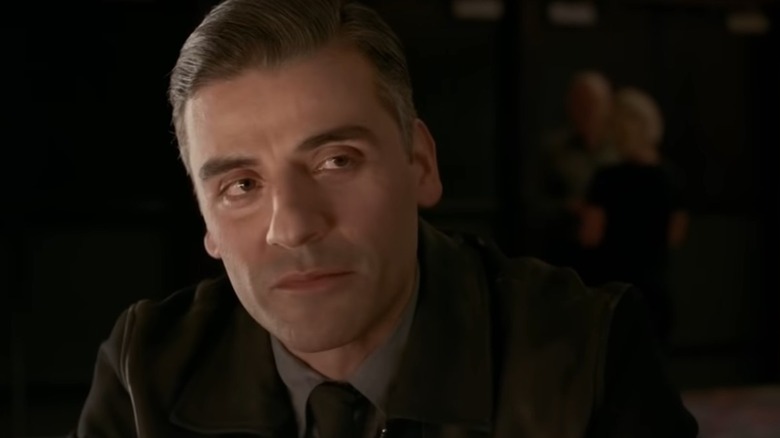Paul Schrader Opens Up About How He Directed His Cast For The Card Counter
No screenplay exists in a vacuum.
The dialogue is meant to be said. The performances are meant to be filmed. And as the words on the page are processed through the middlemen of the director, the cast, and the crew, they can either be elevated or flattened.
Paul Schrader's scripts for "Taxi Driver" and "Raging Bull" may both be brilliant, but they are undoubtedly elevated by having an actor as gifted as Robert De Niro embodying their protagonists. More recently, Ethan Hawke, the lead of Schrader's eco-drama "First Reformed," won an Independent Spirit Award and a large number of local critics association prizes for his performance in that film (Schrader also received his first-ever Academy Award nomination for the screenplay).
As the writer of his latest, "The Card Counter," Schrader undoubtedly had a vision for how he thought the script should look on screen. As its director, it was up to Schrader to push the stars, which included Oscar Isaac, Tiffany Haddish, Tye Sheridan, and Willem Dafoe, to match that vision. As Schrader explains it, it took some interesting methods to get them there.
Paul Schrader helped Tiffany Haddish unlearn her training as a standup
One of Schrader's first tasks was to help Haddish unlearn her comedy cadences. Haddish told the New York Times about an argument the pair had about her line delivery, with Schrader accusing her of "singing when [she's] talking." Haddish wanted to deny it, but soon came to see his point. "That's just the way I talk. I think it comes from doing standup. So it was a lot of me working on trying not to have the singsong voice."
As Schrader put it to IndieWire, "On the first reading of the script we had, frankly, she wasn't very good." He said he had her practice reading her lines with no emotion whatsoever, not in the interest of doing the entire film that way, but so they could later go back and pick which ones to emphasize and accentuate. "Quickly she got that it was a different rhythm," Schrader said.
Haddish learned to think of it as dialing back her natural response to the situations her character, the gambling agent La Linda, would find herself in. "'Your character, you're a charmer,'" Haddish told the Times, quoting Schrader's instructions for her. "'But not as charming as you are in real life. Be charming but not too charming.'"
Paul Schrader prepared Oscar Isaac for his role in The Card Counter
That calls to mind how Schrader told Isaac to approach his role as the guilt-ridden gambler William Tell. "You have to learn to trust that the way these things are put together has more power than the individual movement," the writer/director told IndieWire as he reflected on what said to Isaac.
Isaac's poker-playing Tell is at the center of a complicated plot machine. He's a promising player recruited by La Linda to perform in tournaments, yes, but he also remains haunted by the sins of his past, where he served as an interrogator at the infamous Abu Ghraib prison and did time in military prison for his part in the torture and prisoner abuse that occurred there. After his release, he's found by Sheridan's character, the son of another Abu Ghraib soldier who committed suicide, who wants to bring Tell in on a revenge plot against his old superior officer, Major John Gordo (Dafoe). Tell has no love for Gordo, but in the trailer, he seems to show no interest in joining the plot either.
With all these currents swirling around him, Schrader likened Isaac's role in the film to standing on a rocky coastline to IndieWire. "Waves are going to come up and get you all day every day. They're going to try to batter you. Let them. The waves will go away. You'll still be there. Don't compete. In the end, the rocks will win."
"The Card Counter" premieres in theaters September 10.


